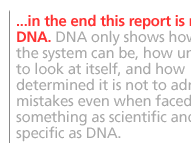 We looked at several of these files. I knew that I wanted a certain kind of
case: no murder, no prior record. Someone in the family who was articulate and
could talk for the inmate in case we could not get to him, and someone who has
been in prison for a very long time. By sheer chance a man by the name of Clyde
Charles seemed to fit the bill: he was accused of rape, had no prior record,
served for 19 years and had an involved and articulate sister.
We looked at several of these files. I knew that I wanted a certain kind of
case: no murder, no prior record. Someone in the family who was articulate and
could talk for the inmate in case we could not get to him, and someone who has
been in prison for a very long time. By sheer chance a man by the name of Clyde
Charles seemed to fit the bill: he was accused of rape, had no prior record,
served for 19 years and had an involved and articulate sister.
The Innocence Project has a very long waiting list. So I called Barry Scheck
one of the co-founders of the Project and said "I'd like to follow this case."
I pointed out to him there was a 10-minute telephone hearing coming up with a
judge within 4 days - and Charles's sister was desperate, afraid that this
would be the very last hearing he would ever get. I said to Scheck "Let's do
it. Will you personally get involved in this one right away?" He agreed. We
talked on a Thursday night. By the following Tuesday he was representing Clyde
Charles in front of the federal judge.
Five months later, after both Scheck and FRONTLINE pushed and pushed and
pushed, Clyde Charles was exonerated and was released from prison having served
there for 19 years.
Now people asked me - aren't you happy? Aren't you proud? Yes, I am happy, and
I am proud that I had some part in releasing an innocent man from prison, but
more than anything, I tremble with fear.
Because, what if we had decided on another case instead? Clyde Charles could
have easily been in prison for another five or ten years. By the time he got
the tests done in November-December 1999, the evidence kit was already badly
degraded - what would have happened in another few years? And who did we not
help? What unhappy family did we just toss aside because the profile was not
what we were looking for?
The Innocence Project is great and deserves all the accolades it gets, but
should we rely on professors and their volunteering students to free innocent
people from prison? Should we rely on a journalist like myself on stumbling
upon one Clyde Charles whose sister sounded good on the phone?
There is also the last story in my report, Earl Washington. He was on death row
charged with rape and murder, before his sentence was commuted to life in
prison. Before he got clemency he had been given a DNA test, the results of
which his lawyers were not allowed to see - not at the time, 1994, and not
even when we met them at the end of 1999.
When we began to research the case, we "the media" went to the lab and asked
to see the results of the DNA tests. They were simply handed to us. And that
is how we, stumbling into the case, told his shocked hard-working lawyers that
their client had been exonerated by the test five years before, and should
have probably gone home a free man, not spend the rest of his life behind bars.
Can something still be done about this poor young man Earl Washington? I
certainly hope so. But is this the way the system is supposed to work? I doubt
it.

What about the Roy Criner case?
The Criner story, which is a rape-murder case, is a true nightmare story.
Everyone agrees that new DNA tests show for certain that it is not Criner's
DNA.. It is obvious to everyone that had the trial taken place today, with the
DNA evidence, he would not have been found guilty. The prosecutor says so, as
does the foreman of the jury. And yet, he was refused a new trial and must
remain in prison for 99 years, or until the people of Texas demand his release,
if this ever comes to pass.
So, again, in the end this report is not about DNA. DNA only shows how rigid
the system can be, how unwilling to look at itself, and how determined it is
not to admit mistakes even when faced by something as scientific and specific
as DNA.
When I am interviewed for this program I am often asked: do you think that
there will be a change in the law regarding DNA? My answer is yes, I think
there will be a change in the law. And this is certainly good. But again if you
look at DNA as a window into to how the system reacts to its own mistakes, the
view is grim and foggy.

home ·
cases ·
speaking out ·
total system failure? ·
how far will it go? ·
video ·
discussion
interviews ·
synopsis ·
tapes & transcripts ·
press
web site copyright WGBH educational foundation
|